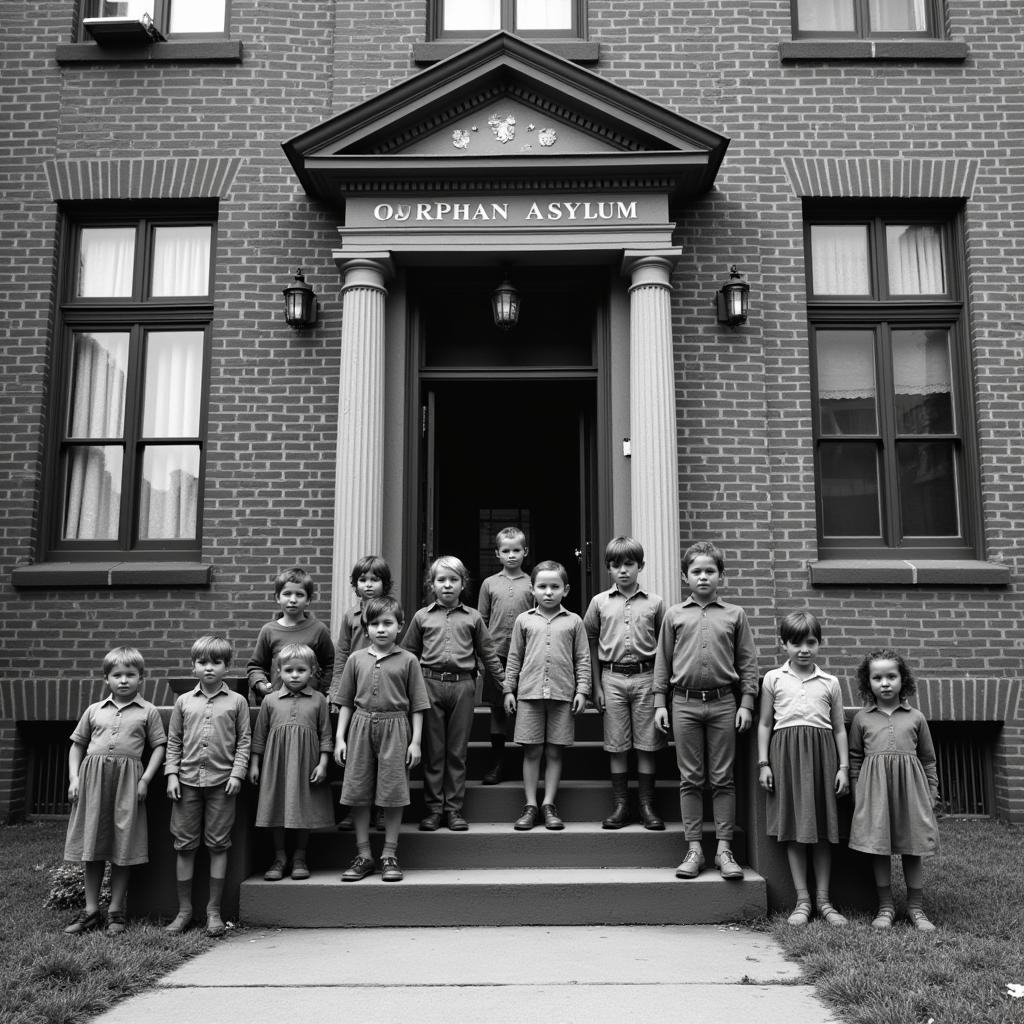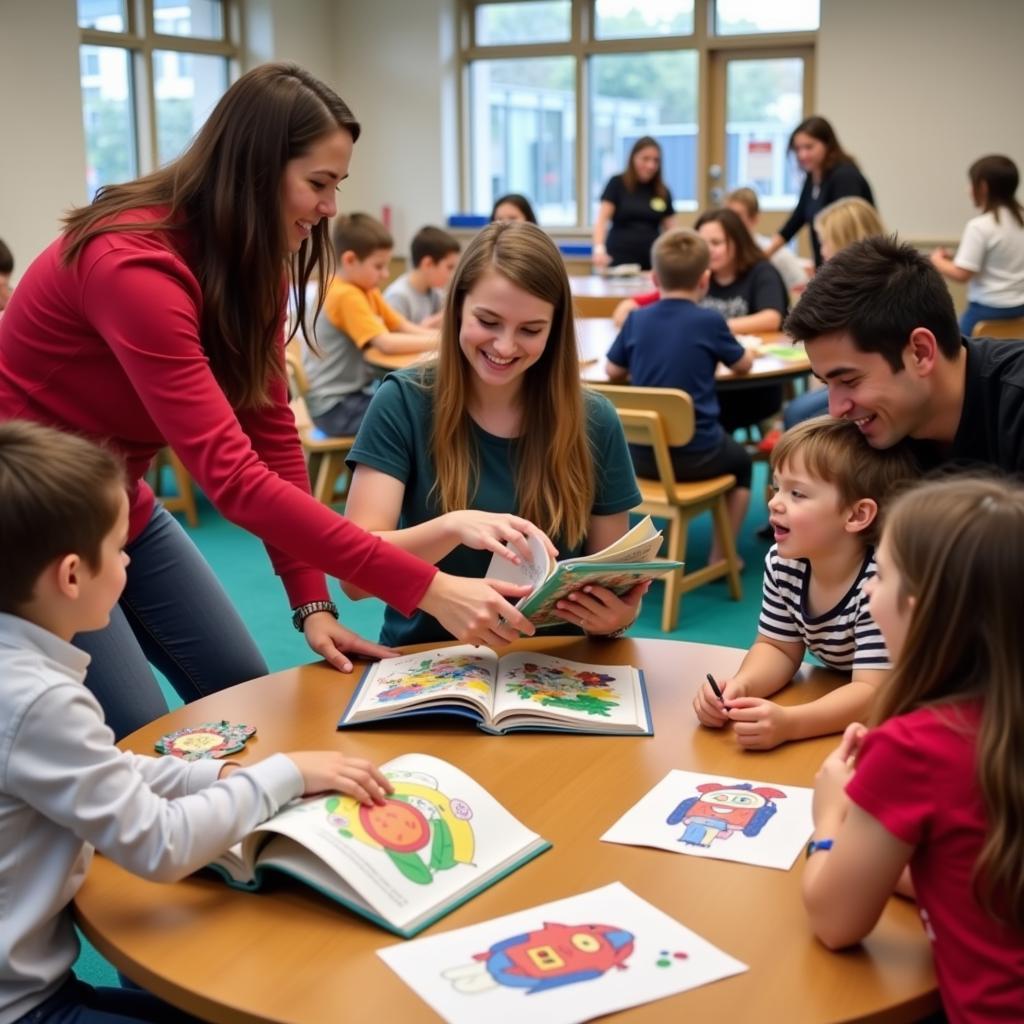Orphan asylum societies have played a pivotal role in providing care and support for children who have lost their parents. These organizations, often rooted in charitable endeavors, emerged as a response to the plight of orphaned and abandoned children, offering them a haven and a chance at a brighter future. Throughout history, the concept of orphanages has evolved significantly, reflecting changing societal attitudes, economic conditions, and an increased understanding of child development. This article delves into the multifaceted world of orphan asylum societies, exploring their historical context, their impact on the lives of countless children, and the challenges they face in the modern era.
 Children standing outside a grand Victorian-era building, identified as an orphan asylum.
Children standing outside a grand Victorian-era building, identified as an orphan asylum.
The Historical Origins of Orphan Asylums
The concept of caring for orphans dates back centuries, often intertwined with religious institutions and acts of charity. However, the formalization of orphan asylums as we know them today emerged in the 18th and 19th centuries, driven by a confluence of factors. Urbanization, industrialization, and outbreaks of diseases like cholera and typhoid led to a surge in the number of orphaned and abandoned children. This societal shift, coupled with a growing sense of social responsibility, spurred the establishment of dedicated institutions to address the needs of these vulnerable children.
Early orphan asylums often faced significant challenges, including overcrowding, limited resources, and a lack of understanding about child development. Despite these obstacles, they provided a crucial safety net for countless children, offering them food, shelter, and often some form of education or vocational training.
Evolving Approaches to Orphan Care
Over time, the approach to orphan care has shifted dramatically. The traditional model of large, institutionalized orphanages has increasingly given way to family-based care models, such as foster care and adoption. This shift is driven by a growing body of research highlighting the importance of stable, nurturing family environments for children’s emotional, social, and cognitive development.
Modern orphan asylum societies have adapted to these changing paradigms, expanding their services beyond residential care. Many organizations now focus on family preservation programs, providing support and resources to struggling families to prevent child abandonment and separation. Others specialize in finding permanent, loving homes for children through adoption or kinship care, prioritizing the child’s best interests and well-being.
The Ongoing Need for Orphan Asylum Societies
While the landscape of orphan care has evolved significantly, the need for orphan asylum societies remains as relevant as ever. Millions of children worldwide continue to face the loss of one or both parents, often due to poverty, conflict, disease, or natural disasters. These children are at increased risk of exploitation, abuse, and trafficking, highlighting the crucial role of organizations dedicated to protecting their rights and ensuring their well-being.
Orphan asylum societies play a vital role in advocating for children’s rights, raising awareness about the challenges they face, and mobilizing resources to support their care and development. They work tirelessly to provide education, healthcare, psychosocial support, and other essential services, empowering children to overcome adversity and reach their full potential.
Looking Ahead: The Future of Orphan Care
The future of orphan care lies in a holistic approach that prioritizes family-based solutions, community-based support, and a commitment to upholding children’s rights. Orphan asylum societies will continue to play a crucial role in shaping this future, advocating for policy changes, developing innovative programs, and partnering with communities to create a world where every child has the opportunity to thrive.
 A group of volunteers, both men and women of diverse ages and backgrounds, are engaging in various activities with children at an orphanage.
A group of volunteers, both men and women of diverse ages and backgrounds, are engaging in various activities with children at an orphanage.
Dr. Emily Carter, a renowned child psychologist and advocate for children’s rights, emphasizes the enduring importance of orphan asylum societies: “These organizations are not just about providing shelter, they are about offering hope, opportunity, and a chance for a brighter future. By supporting their work, we invest in the well-being of our most vulnerable citizens and contribute to building a more just and compassionate world.”
Conclusion
Orphan asylum societies have played a transformative role in the lives of countless children, offering them safety, support, and a path towards a brighter future. As we move forward, it is imperative to continue supporting their efforts, embracing innovative approaches to orphan care, and working collectively to create a world where every child has the opportunity to thrive in a loving and nurturing environment.
FAQs about Orphan Asylum Societies
-
What is the primary goal of an Orphan Asylum Society?
The primary goal is to provide care, support, and a safe haven for children who have lost their parents, ensuring their well-being and protecting their rights. -
How have orphan asylum societies evolved over time?
They have shifted from large, institutionalized orphanages to family-based care models, prioritizing foster care, adoption, and family preservation programs. -
What are some of the challenges faced by modern orphan asylum societies?
They often face limited resources, bureaucratic hurdles, and the complexities of addressing the unique needs of each child in their care. -
How can I support the work of an orphan asylum society?
You can support by volunteering, donating, fundraising, or raising awareness about the important work they do. -
What is the future outlook for orphan care?
The future lies in holistic approaches that prioritize family-based solutions, community support, and a steadfast commitment to upholding children’s rights.
For support and assistance regarding orphan asylum societies or related matters, please contact us:
Phone Number: 02043854663
Email: [email protected]
Address: Khu 34, Bac Giang, 260000, Vietnam
Our dedicated team is available 24/7 to provide compassionate support and guidance.